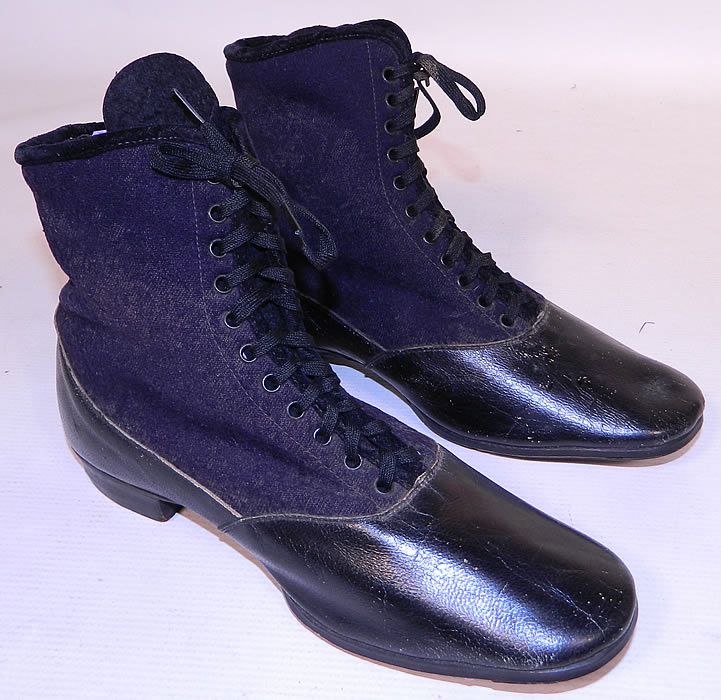With the new Larkspur Wool and Leather Boots, we claim a rather long time period for accuracy, 1810s – 1930s. This bold statement demands evidence, so I’m here to provide it.
The Larkspurs are a reproduction of an original pair we found on eBay. On first look I thought they were 1860s or 70s, basing my dating on the soft square toe, short common sense heel, and the textile upper foxed with leather. Yet even after 12 years of studying historic footwear I was wrong! The extant booties are more likely around 1900-1910.

What caught me out is how out of fashion they appeared to be for turn of the 20th century. None of the hallmarks of 1900s shoes were there, yet I was indeed able to verify the date with primary sources, and a lot of them.
Curiously, in my search, I came across a version of these boots decade after decade, both going back in time and forward. By the 1890s the style was known to be old fashioned; they were even advertised as boots like grandma used to wear….y’know…in the 1850s, which makes sense given that so many visual markers of this design point to earlier styles.
So here is a little chronology…


It’s quite tricky to find older extant boots of this type, as they were commonly regarded as work boots, or generally old-fashioned. Front lacing, for instance, was not fashionable in the 1830s-50s, when side-buttons, side-lacing, and elastic gores were much more favored. The common-ness of boots like these also make them unlikely to pop up in fashion magazines, but they do show up in general catalogs like Sears and Montgomery Ward, which sold anything and everything for everyone at economical prices, including “old lady boots” and “farm and field” footwear.


Interestingly, this style of work boot was unisex. Catalogs commonly seem to show their fancy shoes for women, children, and men first, followed by a section for “utility” shoes and boots for everyone, which included sport shoes and rubbers.





If I were going to choose just one pair of shoes or boots to span the widest range of historical costuming, I would definitely choose these, even though they were not the height of fashion. They’re practical, really comfy, warm, and cute, and you can’t beat a 130+ year lifespan.
The Larkspurs are a straight repro of that eBay bootie. We did them in felted wool uppers and lining with the leather foxing and rubber heel lifts. The toes are soft, the heels short, the felt oh-so-cozy. Check out all colors here.










One Comment
Lacy
October 11, 2022 at 11:49 AMI was flipping through the 1948 Fall/Winter Sears catalog on Archive.org and saw a near clone of these! It’s amazing how far they carry.